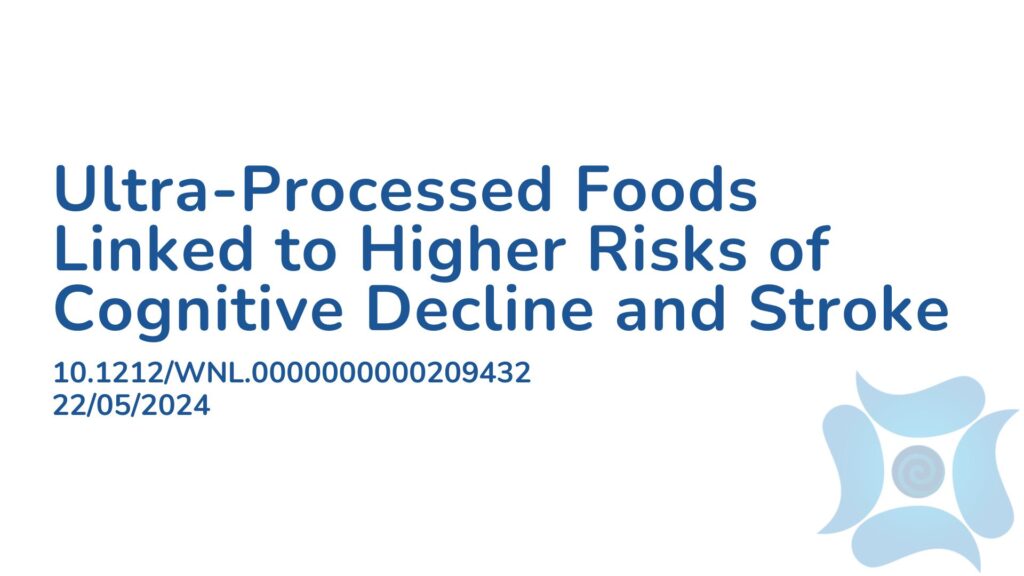Summary:
This study investigated whether ultra-processed foods (UPFs) increase neurological risk, such as cognitive decline and stroke, independently of overall dietary patterns. Participants’ food consumption was categorized and scored in reference to their adherence to common healthy diets, such as the DASH or Mediterranean diet. Cognitive impairment and stroke were assessed through memory and fluency tests and medical record reviews. The cognitive impairment cohort included 14,175 participants without baseline impairment, and the stroke cohort included 20,243 participants without a prior stroke history. The results showed that a 10% increase in UPF intake was associated with higher risks of cognitive impairment and stroke, while unprocessed or minimally processed food intake was linked to lower risks of both outcomes. The stroke risk from UPFs was greater among Black participants. These associations were independent of adherence to any common diets, such as the Mediterranean or DASH diet, suggesting that food processing significantly impacts brain health in older adults beyond known risk factors and dietary patterns.
Abstract:
Background and objectives: Ultra-processed foods (UPFs) are linked to cardiometabolic diseases and neurologic outcomes, such as cognitive decline and stroke. However, it is unclear whether food processing confers neurologic risk independent of dietary pattern information. We aimed to (1) investigate associations between UPFs and incident cognitive impairment and stroke and (2) compare these associations with other commonly recommended dietary patterns in the REasons for Geographic and Racial Differences in Stroke study. This prospective, observational cohort study enrolled Black and White adults in the United States from 2003 to 2007. Methods: The NOVA system was used to categorize items from a baseline food frequency questionnaire according to the level of processing. Participants with incomplete or implausible self-reported dietary data were excluded. Consumption for each category (grams) was normalized to total grams consumed. Scores quantifying adherence to a Mediterranean, Dietary Approaches to Stop Hypertension (DASH), and Mediterranean-DASH Intervention for Neurodegenerative Delay (MIND) diet were also calculated. Incident cognitive impairment was defined using performance relative to a normative sample on memory and fluency assessments. Incident stroke was identified through adjudicated review of medical records. Results: The cognitive impairment cohort (n = 14,175) included participants without evidence of impairment at baseline who underwent follow-up testing. The stroke cohort (n = 20,243) included participants without a history of stroke. In multivariable Cox proportional hazards models, a 10% increase in relative intake of UPFs was associated with higher risk of cognitive impairment (hazard ratio [HR] = 1.16, 95% CI 1.09-1.24, p = 1.01 × 10-5) and intake of unprocessed or minimally processed foods with lower risk of cognitive impairment (HR = 0.88, 95% CI 0.83-0.94, p = 1.83 × 10-4). Greater intake of UPFs (HR = 1.08, 95% CI 1.02-1.14, p = 1.12 × 10-2) and unprocessed or minimally processed foods (HR = 0.91, 95% CI 0.86-0.95, p = 2.13 × 10-4) were also associated with risk of stroke in multivariable Cox models. The effect of UPFs on stroke risk was greater among Black than White participants (UPF-by-race interaction HR = 1.15, 95% CI 1.03-1.29, p = 1.50 × 10-2). Associations between UPFs and both cognitive impairment and stroke were independent of adherence to the Mediterranean, DASH, and MIND diets. Discussion: Food processing may be important to brain health in older adults independent of known risk factors and adherence to recommended dietary patterns.
Article Publication Date: 22/05/2024
DOI: 10.1212/WNL.0000000000209432



